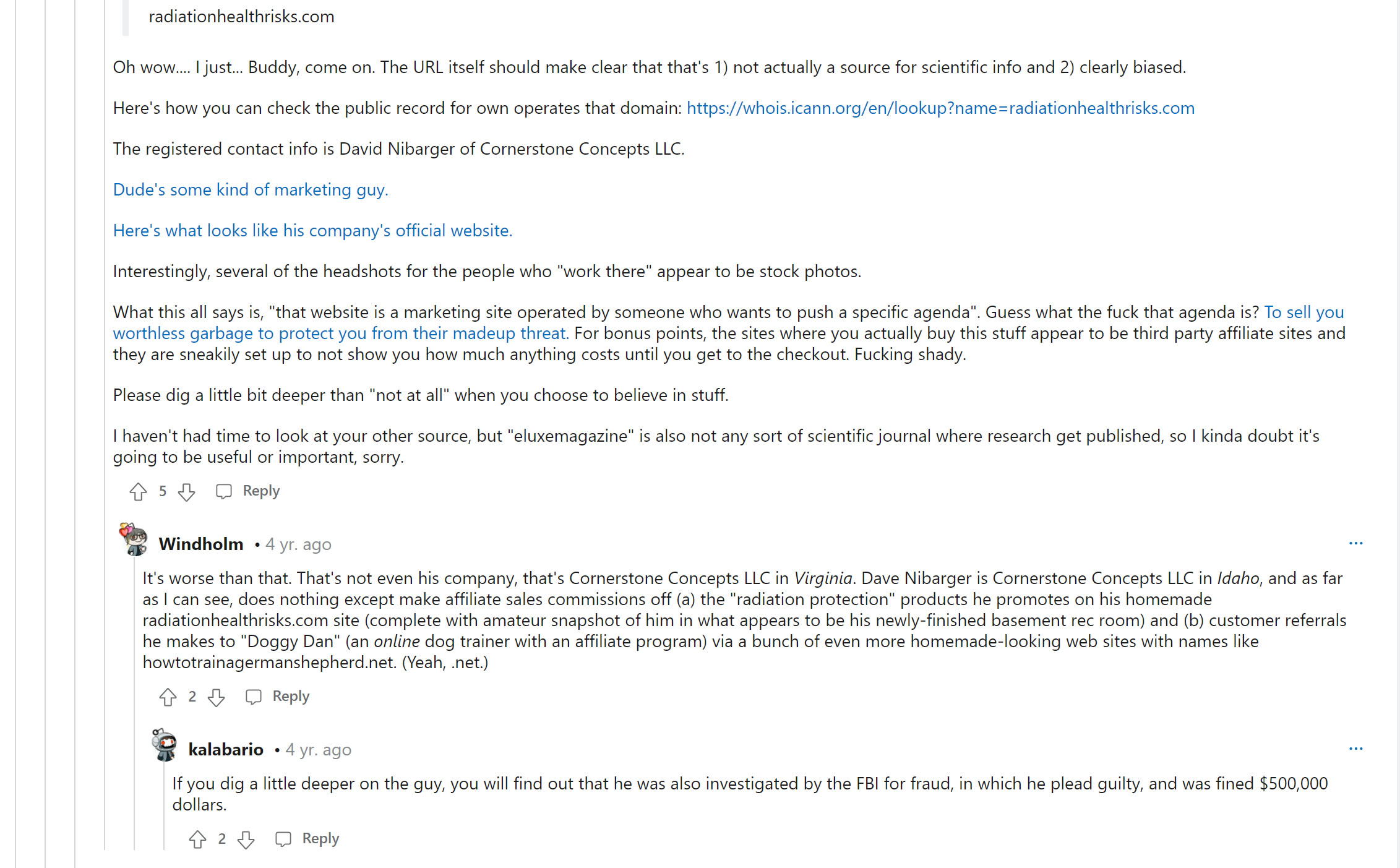Introduction
With the increasing public concern regarding the potential health risks of electromagnetic fields (EMFs), many websites have emerged promoting various EMF protection products. However, some websites, such as radiationhealthrisks.com, by David Nibarger provide misleading and potentially harmful advice to consumers while promoting Amazon affiliate links for monetary gains. It is crucial to understand the dangers of following such advice and the importance of relying on credible sources for accurate information about EMF protection.
The Problem with Misleading EMF Marketing Websites
- Promotion of Dangerous Designs
Websites like radiationhealthrisks.com promote anti-radiation phone cases that contain metal loops and magnets, which can interfere with a phone’s antenna. These design features can lead to increased radiation exposure, posing a risk to users’ health. It is essential to be cautious of such recommendations and verify the safety of the products being promoted.
Why are poorly designed anti-radiation cases dangerous? Disrupting antenna geometry, even a little, affects the amount of radiation you absorb. You are better off with no phone case before using one that will expose you to more radiation. A study on RF Beam formation patterns and SAR values for 5G technology
- Biased and Misleading Testing
In some cases, these websites may present tests comparing different EMF protection products. However, the testing methods may be biased or misleading, as seen in the example provided by the user. Such tests may intentionally manipulate the results to favor specific products, disregarding the true effectiveness and safety of the products being compared.
- Profit-driven Recommendations
Many of these websites may prioritize earning a commission from promoting Amazon affiliate links over providing accurate and reliable information about EMF protection. This profit-driven approach can lead to the promotion of dangerous or ineffective products, potentially putting consumers’ health at risk.
How to Ensure Your EMF Safety
- Seek Credible Sources of Information
Do not rely on the advice of misleading marketing websites for EMF protection. Instead, consult with qualified EMF experts, medical professionals, and reputable organizations that specialize in EMF research and protection. These sources can provide accurate information and guidance on mitigating potential health risks associated with EMF exposure.
- Conduct Thorough Research
Before purchasing any EMF protection product, thoroughly research the product and its effectiveness. Look for products with scientific evidence supporting their claims or those that have been tested and approved by credible organizations.
- Be Skeptical of Biased Testing
When evaluating EMF protection product tests, be skeptical of biased or manipulated results. Always consider the testing methods and whether they accurately reflect the product’s effectiveness.
Conclusion
It is crucial to be cautious of misleading EMF marketing websites that prioritize profit over providing accurate information about EMF protection. Relying on such sources for advice can endanger your health. Always consult credible sources, conduct thorough research, and be skeptical of biased testing. Your health is too important to be compromised by misinformation.
RADIATION HEALTH RISK? – ONLY IF YOU TAKE THESE PEOPLE’S ADVICE!

A husband and wife who own a Spokane company that has been accused by a major insurer of submitting more than 1,200 phony windshield claims are seeking protection from creditors in U.S. Bankruptcy Court here.
The couple, David and Karen Nibarger, last month filed a voluntary bankruptcy petition for Chapter 7 liquidation, listing total assets of about $695,000 and liabilities of about $17.3 million.
By far the largest creditor they listed at $14 million was Farmers Insurance Exchange of Los Angeles. That company announced in Los Angeles on Jan. 13 that it had filed a lawsuit against DKN Industries Inc., of Spokane, doing business as Legacy Auto Glass International, and David Nibarger, DKNs president, accusing them of seeking to defraud Farmers and its policyholders.
Farmers said the civil complaint is similar to previous successful lawsuits against body shops that submitted false insurance claims. It seeks not only monetary damages for the alleged fraud, but also an injunction to halt the alleged deceptive practices.
Neither the Nibargers nor their Spokane attorney, Donald Hackney, could be reached immediately for comment. Dennis B. Kass, an attorney who represents Farmers, says the $14 million figure was mentioned in the lawsuit and is based on a formula used in California, but actual damages were much lower than that.
The $14 million figure was listed in the Nibargers bankruptcy filing as an unsecured nonpriority claim. Among the other largest unsecured creditors listed in the filing are the Spokane-based Northwest Business Development Association, at $222,000, and Inland Northwest Bank, of Spokane, at $188,400.
The largest listed secured creditor is Greenpoint Mortgage, of Columbus, Ga., with first- and second-mortgage claims totaling $641,000 on the Nibargers home and two rental properties they own. Those properties represent all but about $65,500 of the couples claimed assets.
Bankruptcy Court documents show an address of 4305 E. Trent for DKN, but a phone number listed for that company has been disconnected, and the office space at that address is vacant. The phone book shows an address of 1923 N. Hamilton for Legacy Auto Glass, but a different automotive business now is located at that address, and the Legacy phone number also no longer is valid.
Farmer’s lawsuit accuses Legacy Auto Glass of a pervasive scheme of deliberately overbilling Farmers for services on 1,211 occasions. It claims the defendants created sham offices in remote areas just so they could submit much larger billings. Under national guidelines, automobile glass claims are paid at a premium if a shop is located in less densely populated areas, Farmers says.
This is a national issue, not a local problem, Doug Ashbridge, director of special investigations for Farmers, said in a Jan. 13 news release announcing the lawsuit. By secretly manipulating the system, this type of scheme leads to millions of dollars in false claims. This is not simply a billing error; our special investigative unit has developed concrete evidence that this was a deliberate effort to defraud.
Ashbridge said, Farmers wants to not only recover the money taken and prevent further phony claims, but the goal is also to make others think twice before submitting false claims. If you try to submit fraudulent claims, you risk being sued for your actions.
Farmers claims its evidence shows that at least 99 percent of the claims submitted by DKN, Legacy Auto Glass, and Nibarger were fraudulent. Along with documenting the fraud by interviewing witnesses, it says it found that locations where Legacy claimed to have shops were sham offices. In one location, it says, there was no glass business, but simply a painted advertisement on the side of another business. A second supposed location was merely storage space, it says.
Ashbridge said, Farmers has teams that are designed to detect precisely this type of fraudulent activity. Similar investigations are proceeding nationwide in an attempt to curb these windshield scams.
Farmers Insurance Group of Cos. claims to be the nations third-largest personal, property, and casualty insurance group, serving more than 10 million households.








